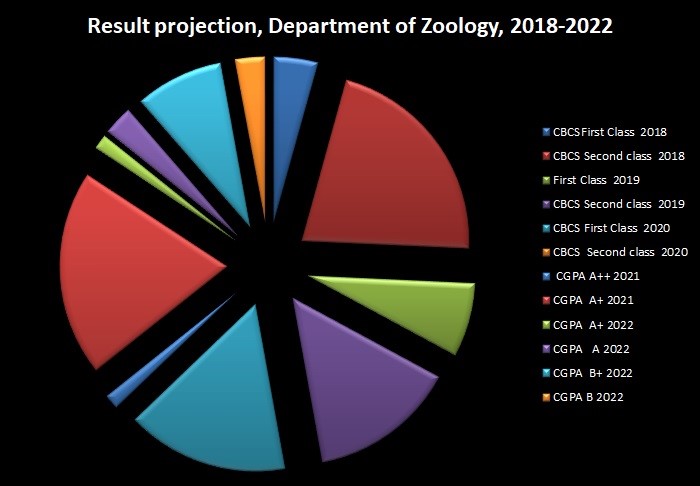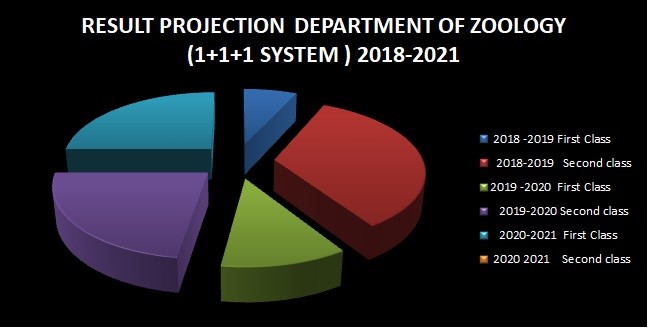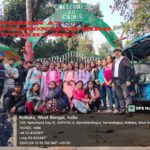- About the Department
- Faculty Profile
- Courses offered
- PO and CO
- Certificate / Add-on courses
- Teaching learning
- Result and student progression
- Departmental Activities and Achievements
- Alumni
- Photo Gallery
As the years passed, the department was embraced by untiring and relentless activities and dedicated endeavors of the newly inducted teachers. The department received fresh infusions of fresh teachers who gave their heartfelt workforce for the development of the department often involving and indulging in execution of responsibilities extending far beyond their typical job descriptions.
The Advanced level of the zoology course was introduced later which witnessed the restructuring of the entire department that flourished with induction of a dedicated advanced and pass course practical laboratories and classrooms. The departmental library, museum, instrumentation were refabricated. The expansion of the departmental facilities and teaching faculties led to the induction of the most inquisitive and hardworking students in the department. Their outstanding score sheets in University examinations ushered in feathers of new colors to the kaleidoscope of departmental progress.
The dynamicity and cohesive interactions of the departmental faculties, laboratory staff and the students, paved the pathway for a global distribution of the successful students in time, spanning the entire length and breadth of the country as well as reaching out to distant locales like Ireland, South Africa, Germany, England, and others.
At the present times, the department possesses a strong foothold and can proudly boast of its well-designed laboratory, instrumental facilities, dedicated library, internet facility as well as availability of both online and offline modes of classroom teaching as per availability and requirement. The department is poised bravely to venture out into the unchartered domains of the National education Policy with firm determinations, expertise and commitment to impart a memorable experience to the future students and contribute to the national building.

Sri. Debasish Roy
Designation: Assistant Professor
Email: debashis675@gmail.com
Phone Number: 9330357484Get Detail »
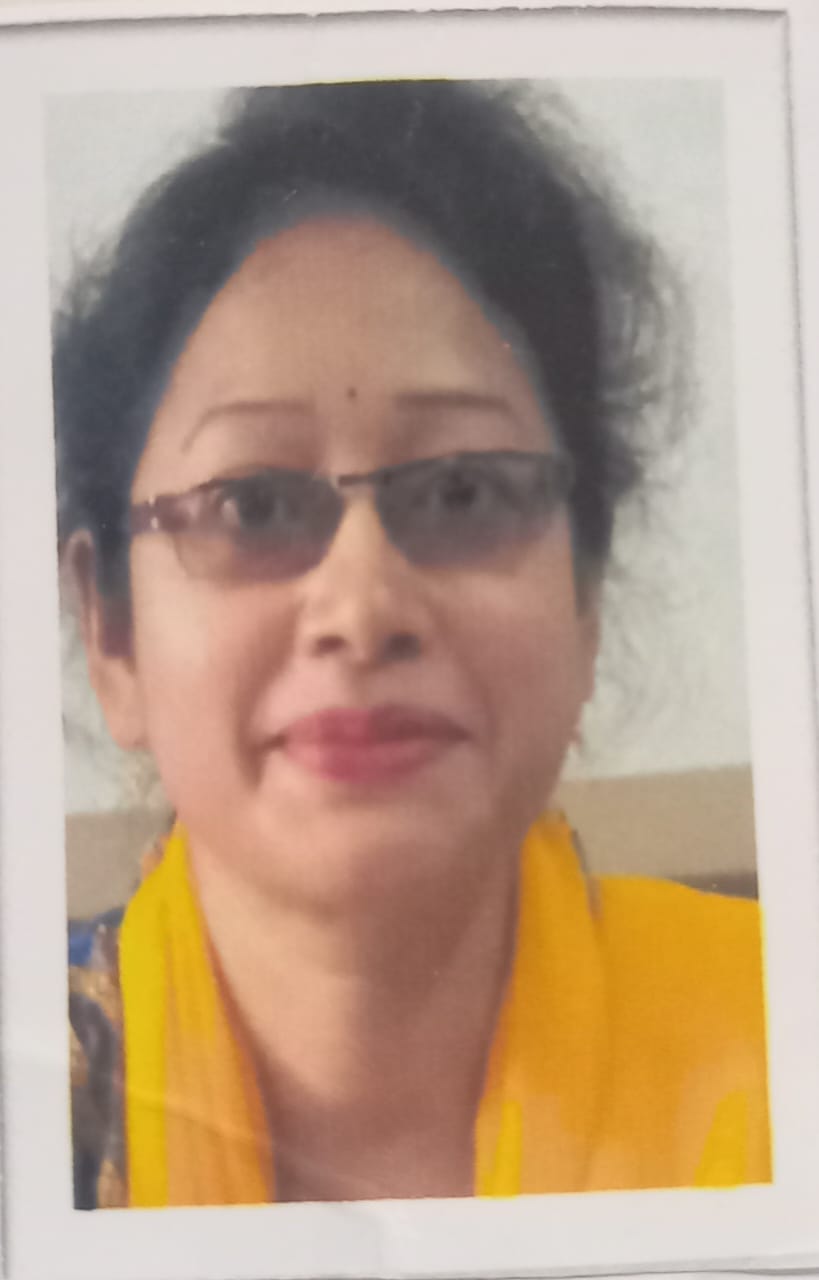
Dr. Mousumi Das
Designation: Assistant Professor
Email: mousumidas21@gmail.com
Phone Number: 9163998404Get Detail »

Sri. Kalyan Bhattacharjee
Designation: SACT
Email: kalyanb024@gmail.com
Phone Number: 9903321698Get Detail »
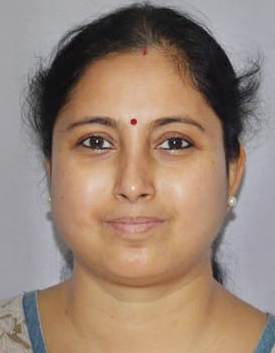
Smt. Rituparna Chatterjee
Designation: SACT
Email: maitraritu9@gmail.com
Phone Number: 9339538323
Get Detail »

Sri Swastik Mukherjee
Designation: SACT
Email: swastikmukherjee03@gmail.com
Phone Number: 9874488750Get Detail »
Specification : ZOOLOGY (Hons.), Elective papers- Chemistry and Botany
Specification: For B.Sc. Bio General – Zoology, Chemistry, Botany
B) B.Sc. (Under NEP-CCF 2022) –
Zoology (Major) – 4 years course (Hons. and Hons. with Research)
Zoology (MDC) – 3 years Course
During B.Sc. course, we are offering students add-on/certificate courses related to Biological Sciences or relevant subject.
- Programme Outcomes
- Sc. ZOOLOGY , NEW SYLLABUS (2016)
Study in Zoology is designed to encourage the acquisition of disciplinary or subject knowledge and skills. The new syllabus (2016) provides an in depth understanding of relevant theories, concepts, and principles of zoology besides having an insight into the philosophy of the subject. Students can attain comprehensive knowledge from different subfields of Zoology (animal diversity, principles of ecology, comparative anatomy and developmental biology of vertebrates, physiology and biochemistry, genetics and evolutionary biology, animal biotechnology, applied Zoology, aquatic biology, immunology, reproductive biology, and statistics), and other related fields of study, including broader interdisciplinary subfields such as biochemistry and environmental studies. Students will also be able to use modern instrumentation for advanced genomic and proteomic technology. Project-based learning, field-based learning, substantial laboratory-based practical component and experiments, open-ended project work etc. will benefit the students from different perspectives.
Students will be able to identify the major groups of organisms, discuss the basis of their biodiversity and draw parallels with their phylogenetic relationship, using well thought cardinal features of classification on the basis of morphology and molecular information wherever available. This principle of comparative biology should be followed in understanding comparative anatomy, physiology and other functions for all in the hierarchy of animal evolution. This shall allow the student to gain comprehensive knowledge about different animal species in one go, appreciating the differences and similarities, thereby achieving proficiency in handling them experimentally or for research purposes. A comprehensive knowledge of structure-function relationship at the level of gene, genome, cell, tissue, organ, and systems, through development would further add to the knowledge base and the learning outcome in terms of editing of genes and genomes for industrial application and research purposes.
The syllabus is also designed to develop the analytical techniques and problem-solving skills relevant to graduate-level employment. Students are encouraged to see themselves as producers of knowledge and collaborators in their learning experience. Practical will allow students to develop laboratory skills and skills in fieldwork, surveying, data handling and processing. Students will also develop their own interests through self-guided research skills, as library based study and background research and project work. There are site visits and lectures by external specialists to provide opportunities to meet animal scientists employed in various fields of Zoology. Students can get roadmaps from them and would be zoology professional by specializing in Paleozoology, Ornithology, Herpetology and Arachnology etc. After successfully completing the discipline, the students will be able to acquire the skills to manage a dairy farm, beekeeping farm, poultry farm, sericulture or to start one with adequate inputs. Students can develop integrated management for better crop production by using organic farming and vermicomposting. Aquaculture including pearl culture and ornamental fish farming and trading might be an enduring practice for students. The subject will also give students to the concept of ecotourism and its economic, cultural and environmental impacts at different scales which are very important for sustainable development.
- Sc. ZOOLOGY, CBCS (2018)
The core courses of Zoology would fortify the students with in-depth subject knowledge concurrently; the discipline specific electives will add additional knowledge about applied aspects of the program as well as its applicability in both academia and industry. The skill enhancement courses would further add additional skills related to the subject as well as other than subject. In brief, the students graduated with this type of curriculum would be able to disseminate subject knowledge along with necessary skills to suffice their capabilities for academia, entrepreneurship and Industry.
The course content has been divided into units with a breakup of the topics to be covered to provide the students better understanding of the main theme represented in the title of each unit. Such type of design is to indicate the breadth of content to be taught thus ensuring more or less uniform coverage of information on a certain theme.
Zoology is the study of all animal life; from primitive microscopic malaria-causing protozoa to large advanced mammals, across all environmental spheres from red deer in mountain forests to dolphins in deep oceans, and from underground burrowing voles to golden eagles in the skies. Some of these animals are useful to us and we nurture them as pets or livestock; some are serious pests or disease-causing; and some are simply splendid and awe-inspiring. No matter what our relation with the animals is, we need to understand their behaviour, population dynamics, physiology and the way they interact with other species and their environments. It provides students with the knowledge and skill base that would enable them to undertake further studies in Zoology and related areas or in multidisciplinary areas that involve advanced or modern biology and help develop a range of skills that are relevant to wage employment, self-employment and entrepreneurship.
The modern era requires a classical zoologist with a modern approach to master many subjects of Zoology. There is a need for the students to compete with the globe; therefore, the main focus of this curriculum is to enable the student to be professionally competent and successful in a career. Having Zoology as backbone of the curriculum, this course, with the department centric electives will enhance the skills required to perform research in laboratory and experimental research. The students can choose to focus on a “whole animal” or a “bits of animals” approach. The “whole animal” pathway makes the students proficient in the identification and study of animals while the latter approach provides the skills required to pursue laboratory and experimental work such as disease research, DNA technologies, wildlife forensics etc. Through this curriculum a student at B.Sc. level can be a specialist in immunology, animal behaviour or genetics in future which maximise the students’ employment probability.
- Course Outcomes
- Sc. ZOOLOGY , NEW SYLLABUS (2016)
|
ZOOLOGY HONOURS AND GENERAL
|
||
|
Paper 1
|
Unit I | Students will gain knowledge about Diversity and Functional Anatomy of Non-chordate and Chordate Forms |
| Unit II | Students will learn basic concepts of Cell biology and Genetics | |
|
Paper 2
|
Unit I
|
This domain will illustrate the Developmental aspects in chordates. It also deals with a comparative account of development in some select groups of animals |
| Unit II | Students will able to understand inner working of Animal forms and Comparative anatomy; Cytological methods and Genetics; Osteology and Embryology from Practical point of view | |
|
PART – II HONOURS
|
||
|
Paper 3
|
Unit I | This unit shall allow the student to gain comprehensive knowledge about Systematics, Evolutionary Biology and Adaptation |
| Unit II | Student will gain knowledge about Animal Behaviour, Ecology, Biodiversity and Conservation | |
|
Paper 4
|
Unit I | Student will gain in-depth knowledge in Animal physiology and Biochemistry |
| Unit II | Student will be able to demonstrate knowledge of Ecological methods, Systematics and Evolutionary Biology; Animal Physiology and Biochemistry | |
|
PART – III HONOURS
|
||
|
Paper 5
|
Unit I
|
Students will attain knowledge in Molecular Biology |
| Unit II | Students will be able to understand Parasitology, Microbiology and Immunology | |
|
Paper 6
|
Unit I
|
This unit would fortify the students with Integration Biology and Homeostasis |
| Unit II | Students would be able to disseminate knowledge about Animal Biotechnology and Applied Zoology | |
|
Paper 7
|
Students should be equipped to understand Molecular biology, Parasitology, Microbiology, Immunology; Histological techniques and staining methods along with Adaptation | |
|
Paper 8
|
Students will learn basic Instrumentation, Biostatistics, Environmental audit and Field work assessment | |
|
PART – I GENERAL
|
||
| PAPER – I | Students would be able to disseminate knowledge about Non-Chordate, Cell Biology, Genetics, Molecular Biology and Developmental Biology | |
|
PART – II GENERAL
|
||
| PAPER – II | This unit would fortify the students with knowledge in Chordate, Ecology, Animal Behaviour, Biodiversity and Wildlife, Histology, Endocrinology, Animal Physiology and Biochemistry | |
|
PART – III GENERAL
|
||
| PAPER – III | Student will gain in-depth knowledge in Applied Zoology, Evolutionary Biology, Parasitology and Immunology. This paper also contain practical exercises which will help the students to apply their knowledge in future course of their career development | |
- Sc. ZOOLOGY, CBCS (2018)
| ZOOLOGY HONOURS | |
| PART I; SEM I | |
| CC 1 | Students will be able to acquire an in-depth knowledge in Non-Chordates specially from Protists to Pseudocoelomates |
| CC 2 | Students will able to understand the structure of DNA, central dogma, gene regulation and different techniques in Molecular Biology |
| PART I; SEM II | |
| CC 3 | This course will illustrate all Coelomate Phyla of Non Chordata |
| CC 4 | Students will learn basic concepts of Cell biology, cell cycle and cell signalling mechanisms |
| PART II; SEM III | |
| CC 5 | Student will gain knowledge about different classes of Chordata |
| CC 6 | Student will gain in-depth knowledge in Animal Physiology related to Controlling & Co-ordinating System |
| CC 7 | Students will be able to understand about the importance and scope of Biochemistry. They will learn about structures of carbohydrates, lipids, proteins, nucleic acids and enzyme kinetics |
| SEC-A (1/2) | Student should be able to learn principles of sustainable Sericulture and how these principles can guide silk moth rearing into an enduring practice in Sericulture. Student also should be able to know about tools and equipment of Apiculture along with principles of sustainable beekeeping |
| PART II; SEM IV | |
| CC 8 | Student will gain knowledge about Comparative Anatomy of different Vertebrate systems |
| CC 9 | Student will gain in-depth knowledge in Animal physiology emphasizing Life sustaining system |
| CC 10 | Students will learn basic concepts of Immunology along with hypersensitivity and vaccines |
| SEC- B(1/2) | Learners will be able to develop and implement public health interventions and will able to apply knowledge of the principles of disease, injury prevention and control Medical diagnosis. In Aquarium Fisheries learners will be able to learn the scientific methods of setting an Aquarium and will know culture breeding and marketing techniques of common indigenous ornamental Fishes |
| PART III; SEM V | |
| CC 11 | Students will be able to know the evolutionary and functional basis of ecology, understand what makes the scientific study of ecology a crucial and exciting endeavour, engage in field-based research activities to understand well the theoretical aspects taught besides learning techniques for gathering data in the field. |
| CC 12 | Students should be equipped to understand basic Principle of Genetics to Genetic fine structure |
| DSE A(1/2) | Students will be able to identify the types of insect pests particularly the most common one, know the methods of sampling of the pests, and understand the effective way of insect pest management strategy. Students will also be able to identify different types of parasites and diseases caused by the parasites |
| DSE B (1/2) | Endocrinology will give general idea of Endocrine systems. Whereas Reproductive Biology gives idea of Histoarchitechture of reproductive organs in human, functional anatomy of male and female reproduction and reproductive health |
| PART III; SEM VI | |
| CC 13 | This domain will illustrate the students about Developmental aspects in chordates. It also deals with a comparative account of development in some select groups of animals |
| CC 14 | Students would be able to disseminate knowledge about Evolutionary Biology, from origin of life to Geological time scale, from species concept to population genetics, and phylogeny |
| DSE A (1/2) | Animal Biotechnology would fortify the students with techniques in gene manipulation, animal cell culture and application of techniques in health. From Animal Cell Biotechnology students will learn Molecular Techniques in Gene manipulation, Genetically Modified Organisms, and different Culture Techniques and Applications |
| DSE B (1/2) | Students will be able to learn Patterns of Behaviour, Social and Sexual Behaviour, Chronobiology & Biological Rhythm in Animal Behaviour. Students will learn about basic concepts of aquaculture, fisheries, and fish in research in Fish & Fisheries |
|
ZOOLOGY GENERAL
|
|
| PART I; SEM I | |
| CC 1/ GE1 | Students will be able to understand Animal Diversity from Kingdom Protista to Mammals |
| PART I; SEM II | |
| CC 2/GE2 | Students will be able to develop critical understanding how a single-celled fertilized egg becomes an embryo and then a fully formed adult by going through three important processes of cell division, cell differentiation and morphogenesis. Students will also realize the Comparative Anatomy of different systems in chordate |
| PART II; SEM III | |
| CC 3/GE3 | Students will be able to understand about the importance and scope of Physiology and Biochemistry |
| SEC-A (1) | Student should be able to know about tools and equipment of Apiculture along with principles of sustainable beekeeping and how these principles can guide beekeeping into an enduring practice |
| PART II; SEM IV | |
| CC 4/GE4 | Students will be able to acquire an in-depth knowledge in Genetics and Evolutionary Biology |
| SEC- B(1) | Learners will be able to learn the scientific method of setting an Aquarium and will know culture breeding and marketing techniques of common indigenous ornamental Fishes |
| PART III; SEM V | |
| DSE A (1) | From this course students will gain knowledge about the commercial and industrial significance of animals, the techniques of rearing of animals for commercial usage and the prerequisites for their successful maintenance and sustenance. |
| DSE B (1) | Learners will be able to understand the Aquaculture systems and environmental impacts of aquaculture |
| SEC-A (1) | Student should be able to learn principles of sustainable Sericulture and how these principles can guide silk moth rearing into an enduring practice |
| PART III; SEM VI | |
| DSE A (1) | Students will be able to identify the types of insect pests particularly the most common one, know the methods of sampling of the pests, understand the effective way of insect pest management strategy |
| DSE B (2) | Students will be able to know the evolutionary and functional basis of ecology, understand what makes the scientific study of ecology a crucial and exciting endeavour, engage in field-based research activities to understand well the theoretical aspects taught besides learning techniques for gathering data in the field. Students will also know about Wildlife Conservation, necessity for wildlife conservation, about National parks and sanctuaries etc. |
| SEC-B (1) | Learners will be able to develop and implement public health interventions and will able to apply knowledge of the principles of disease, injury prevention and control Medical diagnosis |
- Mentor-Mentee system (academic year 2023.-2024)
In order to accommodate various requirements of the students outside typical class hours and interactions, the Department of the zoology has taken extensive measures to execute the mentor- mentee program for the benefit of the students in almost all spheres of their college life including education, as per requirements provided as input by the students concerned.
The program is based on the distribution of students to different mentors as per lottery so that their personal requirements like assistance in learning, preparation of exams, mental health and understanding, peer group interactions, strategies for coping with the pressures of exams and the education system as well as their family problems or personal problems under specific situations. The mentor mentee groups for the academic session 2023-24 are as follows-
| Student’s name (mentee) | Teacher’s (Mentor) name | Semester |
| Abhishek Gayen | Mousumi Das | 1st Sem, Major |
| Selima Mondal | Mousumi Das | 1st Sem, Major |
| Sanchayan Naskar | Mousumi Das | 1st Sem, Minor |
| Debangshu Sekhar Mondal | Mousumi Das | 1st Sem , Minor |
| Sandipan Kayal | Mousumi Das | 3rd Sem, Hons. |
| Shiblal Bera | Mousumi Das | 3rd Sem, Hons. |
| Alokesh Singha | Mousumi Das | 3rd Sem, Gen |
| Suprakash Das | Mousumi Das | 3rd Sem, Gen |
| Ankana Mondal | Mousumi Das | 5th Sem, Hons. |
| Sudipta Mondal | Mousumi Das | 5th Sem, Hons. |
| Arpita Majumder | Mousumi Das | 5th Sem, Gen |
| Prithish Naskar | Debashis Roy | 1st Sem, Major |
| Shibayan Naskar | Debashis Roy | 1st Sem, Major |
| Soumita Halder | Debashis Roy | 1st Sem, Minor |
| Bipul Biswas | Debashis Roy | 3rd Sem, Hons. |
| Soumyadeb Patra | Debashis Roy | 3rd Sem, Hons. |
| Avirup Mondal | Debashis Roy | 5th Sem, Hons. |
| Arghya Mondal | Debashis Roy | 5th Sem, Hons. |
| Raktim Rudra | Debashis Roy | 5th Sem, Gen |
| Soumyadip Mondal | Kalyan Bhattacharjee | 1st Sem, Major |
| Md. Asifur Rahaman | Kalyan Bhattacharjee | 1st Sem Minor |
| Md. Maskur Ahamed | Kalyan Bhattacharjee | 1st Sem Minor |
| Dipendu Mondal | Kalyan Bhattacharjee | 3rd Sem, Hons. |
| Fultusi Mondal | Kalyan Bhattacharjee | 3rd Sem, Hons. |
| Anamika Das | Kalyan Bhattacharjee | 5th Sem, Hons. |
| Rijuan Molla | Swastik Mukherjee | 1st Sem, Major |
| Shreya Mondal | Swastik Mukherjee | 1st Sem, Major |
| Dhishwari Naskar | Swastik Mukherjee | 1st Sem, Major |
| Koushik Mondal | Swastik Mukherjee | 1st Sem, Minor |
| Allolika Das | Swastik Mukherjee | 1st Sem, Minor |
| Tamal Mondal | Swastik Mukherjee | 3rd Sem, Hons. |
| Akbar sk. | Swastik Mukherjee | 3rd Sem, Hons |
| Rupak Mondal | Swastik Mukherjee | 5th Sem, Hons. |
| Sabnam Khatun | Swastik Mukherjee | 5th Sem Gen |
| S.M. Arshalan Ashraf | Rituparna Chatterjee | 1st Sem, Major |
| Supriyo Sardar | Rituparna Chatterjee | 1st Sem, Major |
| Mitra Snafui | Rituparna Chatterjee | 1st Sem, Minor |
| Suhrid Kanti Bera | Rituparna Chatterjee | 1st Sem, Minor |
| Arnab Das | Rituparna Chatterjee | 3rd Sem, Hons. |
| Disha Sardar | Rituparna Chatterjee | 3rd Sem, Hons. |
| Meheboob Hossain | Rituparna Chatterjee | 5th Sem, Hons. |
- Remedial classes
Remedial classes provide the means to clarify doubts of students regarding specific topics of syllabus. It also helps them to successfully handle question answers in examinations. Such remedial sessions are also essential for the weaker students or those having issues with English as they come from a strictly vernacular educational background. In order to assess and mitigate such issues, remedial classes has been successfully conducted by the department of Zoology for the students of all semesters in both CBCS and NEP regulations. Participation of the students is interactive via course module discussions, question answer sessions etc. and it proved to be highly fruitful.
- Participative/Experiential learning
Educational tours organized by the department in Academic year 2023-24:
| Places of Excursions | Excursions conducted for | Month and Year |
| Alipore Zoological Garden , Kolkata | 5th sem. Zoology Hons. students | January, 2024 |
| Azadgarh State Poultry farm, Kolkata | 1st sem. MDC students | January, 2024 |
| Santragachi Jheel, Howrah | 5th sem. Zoology General. students | January, 2024 |
| Chintamani Kar Bird Sanctuary, Kolkata | 1st sem. IDC students | February, 2024 |
| Narendrapur Ramkrishna Mission, Agricultural Unit | 1st sem. Zoology Major students | February, 2024 |
Poster presentation:
| 5G-Advantages and Disadvantages | Presented by 5th sem. Zooloy Hons. Students on 03.01.2024 |
| Fossil fuel | Presented by 5th sem. Zooloy Hons. Students on 03.01.2024 |
Question Bank:
Every year we arrange Entry Level Test for new 1st sem. students. We also take continuous internal assessments, class tests, and surprise tests for all students. The hard copy of above mentioned question papers are kept in our department. Some question papers are attached herewith.
Facilities
Laboratory: The Department of Zoology has 2 laboratories. 1. Advance Lab, 2.General lab. The Department is enriched with many well-known equipments like- Centrifuge Machine, Homogenizer, Microtome machine, Colorimeter, PH meter, Hemocytometer, Sahli’s Haemoglobinometer, etc.
ICT facilities: Teachers take classes through PPT presentation which is supported by smart class room of our college.
Our college prepares action plan regarding UG courses which are discussed in Academic council, as per academic calendar issued by University of Calcutta. Then meetings are convened by HOD with all departmental faculties to fix teaching-learning plan for a particular session following the decision implemented by the Academic Council. The plan also includes teachers, engagement in continuous internal assessments for all sem. students, and remedial classes for slow learners.
The syllabi are distributed among the teachers in the departmental meeting under the prerogative of HOD as per the class loads. The Class loads are strictly followed according to the credit mentioned in the Syllabi issued by the University. The teachers prepare lesson plan which is sorted out from the syllabi. The teacher makes use of ICT when it is necessary in teaching. The teachers of our department arrange Excursions, Project Works, Field trips on regular basis for the students. Students acquire the practical experiences under the light of theoretical knowledge.
Ramayani Burman- Scientist, Ireland
Dr. Rachan Karmakar- Assistant Professor, Roorkee Institute of Technology
Mr. Sujit Das- Forest Officer, WBFS (Govt. of WB)
Mr. Ananda Das- Staff, Law office, Kolkata
Dr. Arup Kumar Giri- Teaching Faculty, Baba Mastnath University, Haryana
Sayantani Mukhopadhayay- Research Scholar, Indian Institute of Technology, Guwahati.
Akashlina Marik- Research Scholar, Department of Zoology, University of Calcutta.
Sagarnil Marik- BDS Doctor
Pritam Modak- Lawyer
Souvik Karmakar- Lawyer
Sahanawz S.M- Research Scholar, National Centre for Biological Sciences (NCBS), Bangalore.
Avijit Adak- West Bengal Police Service
Sourav Ghosh- Medical Representative, Kolkata
Our other Alumni are also engaged in various fields like CRPF, medical professions, teaching, reputed MNCs, Govt. and Private Banks, NGOs etc.

